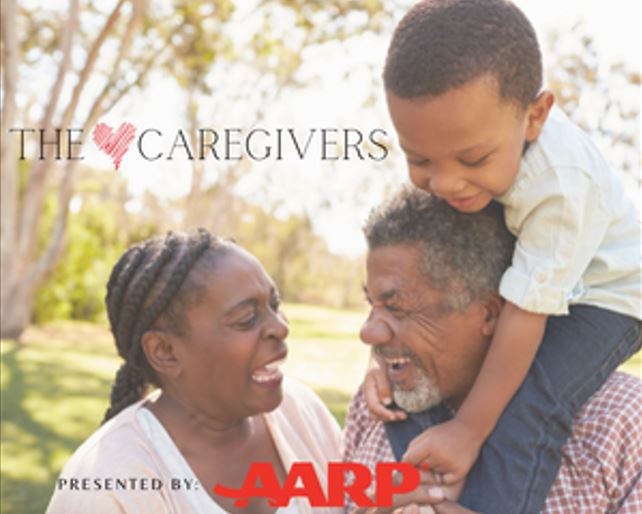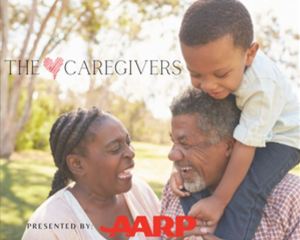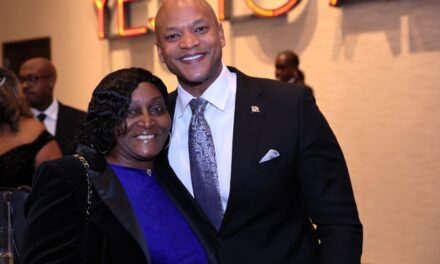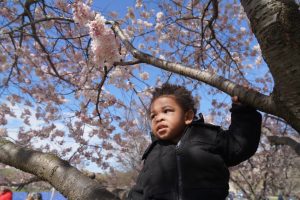 By D. Kevin McNeir
By D. Kevin McNeir
Washington Informer Senior Writer
The Caregivers is a unique series focused on the challenges and triumphs of caregiving. These stories have been created through a strategic partnership between AARP and Word In Black.
Franklin and Vivian Wilds, both in their late 70s and residents of the District since 1971, consider themselves fortunate despite the unprecedented changes to their way of life that have occurred since the onset of the still raging COVID-19 pandemic.
Still, they say that they’ve discovered an unforeseen reason to both celebrate and embrace life in the age of COVID-19: having a lot more time with their five-year-old grandson, Malcolm Franklin Simmons.
“When they closed his preschool in March of 2020, we were able to begin seeing him two or three times a week, often keeping him here overnight and during weekends, too,” Mrs. Wilds said.
Determined to protect themselves from coronavirus and to make sure their only grandson would be safe as well, the Wilds said they were among the first to get the vaccine – even before Malcolm’s school closed its doors.
“As a precaution, we had him wear a mask and helped him understand its importance,” she said. “He still wanted to go outside and interact with other children, so wearing a mask become part of both our routine and his.”
“Eventually, he would remind me or my husband to put on our masks when we ventured outside. In some ways, it became fun for him – almost like a game – while it quickly became essential for us,” said Mrs. Wilds, a career director at Trinity University for the past 20 years.
Her husband, affectionately referred to as “Frank” and who she met in their hometown of Darlington, South Carolina, owns and continues to manage a D.C.-based marketing firm as well as a maintenance company, which provides service on city bus shelters in Philadelphia.
He, too, said he thoroughly enjoys having more time with his grandson, who lives nearby in Alexandria, Virginia, with his mother, Nicole (the Wilds’ only child) and Malcolm’s father, Dr. Robert Simmons.
“Things are a lot different from when we grew up,” Mr. Wilds said. “First, my wife and I both grew up in large families, so there were always others for us to play with. Malcolm’s very inquisitive, when you can drag him away from his iPad, computers and computer screens or televised shows like ‘Paw Patrol,’ which were things we knew very little about before he came into our lives.”
“But some things don’t change from one generation to another. Like most little boys, he loves climbing trees and throwing rocks and creating games that we can all play together. And he likes to talk to and meet people – he’s not bashful. Sometimes, because of the pandemic and the many closures to schools, restaurants and other places, it’s just the three of us. And we wonder, when things open back up fully, if it will be difficult to teach him how to adjust to a more structured world.”
Black grandparents share many similarities
The Wilds remain part of a growing cohort of other grandparents of color who often share similar concerns, beliefs and characteristics.
In a 2018 AARP report, “Grandparents Today National Survey,” African-American grandparents were polled on a variety of issues. Consider just a few of the results as listed below which illustrate the richness of their community and the value they play in the lives of their grandchildren, while also indicating several poignant barriers.
1) Black grandparents become grandparents younger and have a larger number of grandchildren than the general population.
2) They view finances as a grandparent challenging; one in five state that their financial status is a barrier to seeing more of their grandchildren.
3) They care deeply about their grandchildren’s future and actively ensure their grandchildren have the best chances of success in life.
4) They are a source of heritage and wisdom, while virtually all have strong connections to cultural roots (97%).
5) Black grandparents are more likely to be in hands-on roles in the upbringing of grandchildren (e.g., discipline, mentoring, and financial support) and significantly more likely to be a primary caregiver than the general population (31% vs. 5%).
6) They champion the importance of academic achievement for their grandchildren, with one in five putting a significant amount of money towards their grandchildren’s school/college tuition.
7) Similar to all grandparents, they view their parenting to be superior to the current generation and Black grandparents are strong supporters of spanking as a form of discipline (67%).
8) While distance and busy schedules are a challenge, Black grandparents are finding ways to spend time with and to connect with their grandchildren.
More from the Wilds and navigating grandparenthood
Mrs. Wilds acknowledged that while both she and her husband recognize the benefits for those who live in more diverse communities, they also fear that their grandson may find it difficult to understand that diversity does not exist everywhere, nor is it always embraced.
Mr. Wilds said he’s particularly concerned because of the many challenges and inequities which Black boys and men must navigate and overcome in order to survive and thrive.
“My wife and I recently discussed what other Black parents and grandparents refer to as “the talk,” he said. “My greatest fear is that as he gets older, he’ll need to know the truth – the truth about our race, what we’ve gone through in America and still face – and the truth about American society.”
“However, we’re committed to teaching him that Black children, like others, can do positive things in life and achieve their dreams. But that only happens with preparation. Still, I worry about the direction that this country seems to be taking and how racism hasn’t gone anywhere. Instead, it’s taken new forms,” Mr. Wilds said.
His wife said she just wants her grandson to always feel like he “fits in.”
“My husband and I moved from South Carolina to New York City and finally Washington, D.C.,” she said. “But we remember attending segregated schools in the south and being subjected to Jim Crow. Things are better these days. His friends come from many races as do his parents’ friends. It’s different for us. When my husband and I have company, most of them are Black.”
“He has exposure to a world that I did not know. And that’s a good thing. But the world – even American society – is still far more segregated than our grandson realizes or experiences. It’s a lesson that he’ll have to learn one day – one that’s not easy, and one which often hurts,” she said.
As earlier limits on travel or public spaces slowly lift, both grandparents said they’re working harder at helping Malcolm understand that there’s whole world out there – one which will rarely yield to his “more selfish desires.”

“Children have to learn how to sit down for dinner, how to get dressed and go to church, how to eat what’s been prepared instead of believing they can have their favorite snacks or fast food meals,” she said. “They have to learn how to be patient, how to wait their turn and how to get along with others. During the pandemic, we’ve struggled to enforce some of the important modes of behavior.”
“Still, we aren’t concerned. Our grandson brings us so much joy – more joy than we could have imagined. And children learn how to adapt to change. We’ve had to do the same thing recently. We’ve even learned how to talk to Malcolm with Facetime when we want to see him but can’t,” Mrs. Wilds said.
“Truth be told, ever since he first called us Grandpa and Grandma, which was one of the most exciting days or our lives, we were all his,” she said.

Help us Continue to tell OUR Story and join the AFRO family as a member – subscribers are now members! Join here!
The post The Caregivers: COVID-19 changed the roles for many of today’s Black grandparents appeared first on AFRO American Newspapers .











